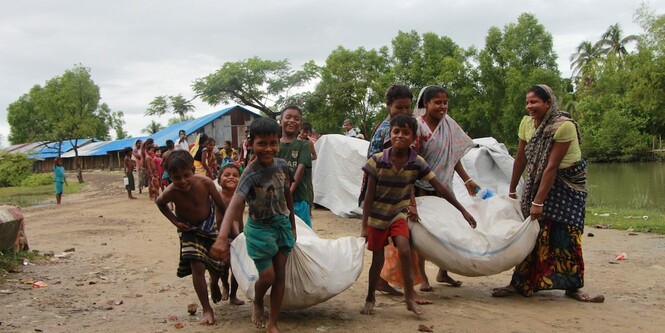
The role of law may not necessarily spring to mind when thinking about how to prepare for a disaster, but this was just what national authorities and the South Sudan Red Cross had put on the table as they discussed the importance of having a disaster risk management law and policy in place.
South Sudan, a young nation that has made headlines before and after it gained independence in 2011, is one of more than a hundred countries that the International Federation of Red Cross and Red Crescent Societies (IFRC) has worked with over the past decade to strengthen their legal frameworks for disaster management and response.
A world away from Juba, a celebration will be taking place in Geneva, Switzerland, this week which will mark ten years since the adoption by all State Parties to the Geneva Conventions of the ‘Guidelines for the domestic facilitation and regulation of international disaster relief and initial recovery assistance’ – also known as the IDRL Guidelines.
Real change
The achievements of South Sudan, and the steps it is taking to being better prepared for disasters, will be celebrated along with the many efforts of States, international and regional organizations, civil society, and academia, to see genuine, tangible, legal change in the interests of at-risk and disaster affected communities.
All too often, disaster response operations have been hampered by red tape, or legal barriers to the swift and effective delivery of aid. Delays in the granting of visas, exorbitant customs clearance fees, and mountains of unsolicited can all needlessly complicate and delay an international disaster response, as years of research undertaken by IFRC has demonstrated.
There is a growing understanding that law has a crucial role to play in facilitating and regulating international disaster assistance. In the ten years since the adoption of the IDRL guidelines, around 30 countries have incorporated these standards into their national laws and procedures.
Collaboration to save lives
From the disaster-prone islands of the Pacific, across Asia, to South and Central America, and all the way to South Sudan, States have been working together with IFRC and its National Red Cross and Red Crescent Societies to make sure they have the right laws and procedures in place before the next disaster strikes. Many States have already learned their lesson, with disasters sparking legal reform in Indonesia, the Philippines, Ecuador and Vanuatu – to name a few.
The past decade has brought great improvements in legal preparedness for disaster response – yet more must be done. IFRC remains deeply committed to leading this work globally so that, over the next decade and beyond, international disaster response continues to become more efficient and more effective, and saves more lives.
Learn more
- Model Emergency Decree for the Facilitation and Regulation of International Disaster Relief and Initial Recovery Assistance
- The Checklist on the Facilitation and Regulation of International Disaster Relief and Initial Recovery Assistance
- From law to action: Saving lives through International Disaster Response Law
- Introduction to the Guidelines for the domestic facilitation and regulation of international disaster relief and initial recovery assistance